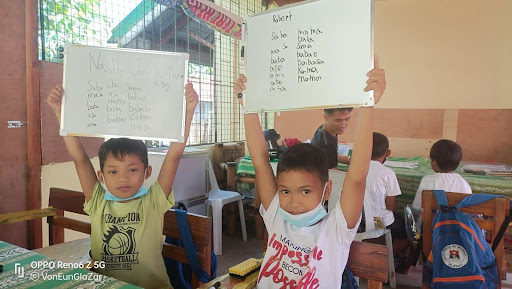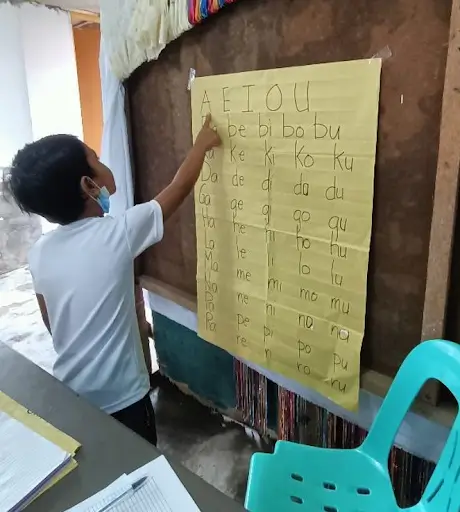
Our Impact Beyond the Numbers
Reading in the Time of COVID: Enabling Hundreds of Learners to Read During the Pandemic

Robert (right) proudly shows off what he has learned for the day.
Eight-year-old Robert Parica, an FH-sponsored child, had a secret. But unlike superheroes who take on secret identities, his secret could have cost him his dream of becoming a nurse. Because even if Robert regularly attended school, he was not able read… until Food for the Hungry stepped in.
“[During his] first reading assessment, Robert did not recognize the letters in the alphabet. He didn’t know how to read simple words.” That was the assessment of Ms. Unica, a Learning Support Aide (LSA) in Robert’s school. She was among the 100 LSAs whom Food for the Hungry Philippines (FHP) commissioned and trained for the six-month Reading Remediation Program launched last February 2022.
Reading: A Road Out of Poverty
The Pilot Reading Remediation Program easily became FHP’s flagship basic education activity towards improving the reading proficiency among Grade 2 and 3 non-and struggling readers. This was because Robert’s story is not an isolated case. His brother, Jobert, also struggled to read and write. He had classmates and schoolmates in Matnog, Camarines Norte who had the same problem. In fact, learning poverty is a nationwide problem with the World Bank reporting in 2021 that out of ten Filipino children, only one can read by the age of ten.
This worsened during the COVID-19 pandemic because of school lockdowns. Jean, Robert and Jobert’s mother, admitted that she struggled with the new learning set up as well. She could not guide her children due to work as a Barangay Health Worker while managing the family’s hollow block business plus house chores. Her husband, Roberto, was also busy farming in order to provide for the family’s needs.
“And so, that was our trigger to come up with a program for reading remediation,” Prudencia Sanoy, FHP’s Technical Specialist for Education said.
She added that without basic literacy, or the ability to read and understand simple text, there is little chance that a child can escape the intergenerational cycle of poverty. Children who do not learn to read in the first few grades are more likely to repeat and eventually drop out of frustration. If a child, who grows into an adult, still cannot read and comprehend simple instructions, the chances of getting a decent-paying job becomes challenging. It is during these formative years- Grades 2 and 3- that children need to achieve minimum reading proficiency.
The Journey of 613 Non and Struggling Readers
Preparations and coordination started as early as October. With the help of partner schools and respective School Division Offices under the Department of Education, FHP identified 613 learners who needed the most help for its pilot. Children came from 42 schools in FHP’s area programs in Tagalog (Navotas, Malabon, Bulacan), Bicol – Robert’s home region, and La Paz Leyte.
Learners attended Reading Remedial sessions three times a week with a minimum of one hour per session for six months. To give ample attention per student during the tutorials, each LSA was assigned only six learners.
While some students and LSAs had classrooms for their sessions, others had to look for alternatives such as the Barangay (town) Halls, and churches. Some LSAs even conducted home visits because the family’s budget could not spare money to send their children to the learning venues. In Bicol, a community provided a government vehicle just so the students can continue learning. To compensate for absences due to learners needing to prioritize chores or take care of their younger siblings, LSAs conducted make-up classes. FHP also provided snacks as an incentive for attendance and hit two birds with one stone: feed children’s hungry stomachs while feeding their minds.
Reaping Rewards
Despite many challenges, everyone persevered— the learners, LSAs, parents, guardians, and even the community!
It was not in vain. In just a span of six months, from being barely able to read or not at all, more than half or 53 percent of the participants were already grade ready. This means they can advance to the next grade level since they already mastered needed reading concepts and skills. In Bicol where Robert and Jobert live, 92 out of 187 became grade ready. It was even better in Area Program Tagalog because from zero, the number of grade ready students increased to 61 percent while La Paz had 49 percent.
As for Robert, he didn’t need to keep his secret anymore. During the last two months of the remedial sessions, he was able to read combinations of 3-4 letters to create simple words. The reading remediation program was just the opportunity he needed to unlock a new world of learning. From being shy because of his secret, he has newfound confidence in himself and participates more in school activities. He asks questions if he does not understand what he is reading. Now he is starting to read short stories at home to practice.
Jobert also improved according to his assigned LSA, Ms. Nancy. “The first day of the tutorial session, Jobert was very shy and had a very short attention span. He had difficulty in reading and writing letters. But now he is learning with help from his brother,” Nancy said.
“When they are inside the house, after Robert is done with his homework and reading, that is the only time he will watch television. Same with Jobert, he copies what his brother does: he studies first before anything else. I have observed that they became more interested in reading and writing unlike before. Robert reads frequently. Jobert becomes very happy whenever he properly writes something,” Jean said.
She added, “It really means a lot. Our children are waking up early in the morning, excited to go to school and learn something new. We also realized the importance of our role as parents in our children’s education. My role as a parent involves attending meetings every month, doing follow-up teaching at home, and preparing food for the children.
Beyond Reading
Aside from reading skills, Jean, like other parents and teachers, also noticed that after the program there were behavioral changes in the children. They were more polite. They showed initiative in doing their homework and housework. They learned how to pray. They became more outgoing and physically active.
“We are so blessed! Even if there is a pandemic that gives us anxiety and fear, with the grace of the Lord we became stronger,” Jean said. “We are full of hope.”
Jean’s hope is for her two sons to finish their studies. She also hopes that someday their hard work will pay off to sustain their everyday needs and more. She also hopes that the children in the community will become future engineers, teachers, police officers, etc. who will help their families, bring pride to their hometown, and contribute to nation building.
“[This is why] reading and supporting the dreams of our children are important.”
